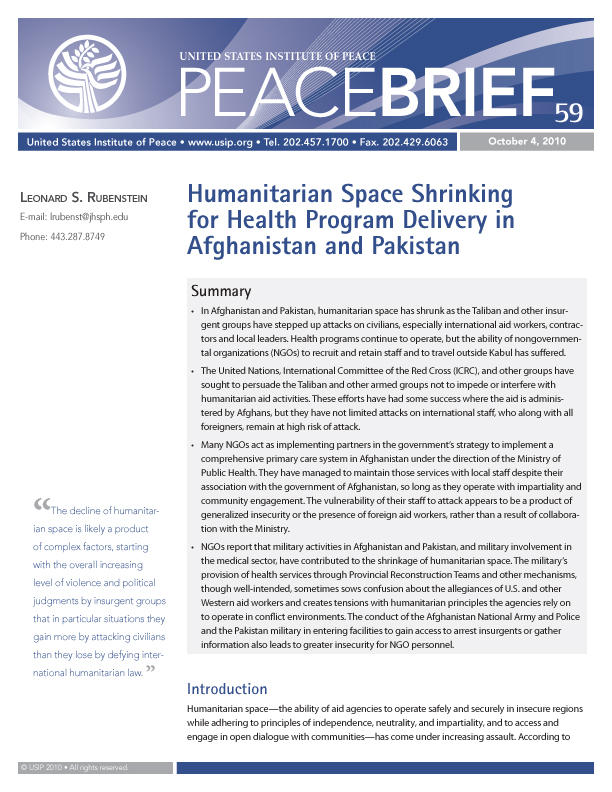This Peace Brief uses the work of one NGO, the International Medical Corps, as a case study to understand the factors that are contributing to the diminution of humanitarian space and actions that could possibly expand it.

 Summary
Summary
- In Afghanistan and Pakistan, humanitarian space has shrunk as the Taliban and other insurgent groups have stepped up attacks on civilians, especially international aid workers, contractors and local leaders. Health programs continue to operate, but the ability of nongovernmental organizations (NGOs) to recruit and retain staff and to travel outside Kabul has suffered.
- The United Nations, International Committee of the Red Cross (ICRC), and other groups have sought to persuade the Taliban and other armed groups not to impede or interfere with humanitarian aid activities. These efforts have had some success where the aid is administered by Afghans, but they have not limited attacks on international staff, who along with all foreigners, remain at high risk of attack.
- Many NGOs act as implementing partners in the government’s strategy to implement a comprehensive primary care system in Afghanistan under the direction of the Ministry of Public Health. They have managed to maintain those services with local staff despite their association with the government of Afghanistan, so long as they operate with impartiality and community engagement. The vulnerability of their staff to attack appears to be a product of generalized insecurity or the presence of foreign aid workers, rather than a result of collaboration with the Ministry.
- NGOs report that military activities in Afghanistan and Pakistan, and military involvement in the medical sector, have contributed to the shrinkage of humanitarian space. The military’s provision of health services through Provincial Reconstruction Teams and other mechanisms, though well-intended, sometimes sows confusion about the allegiances of U.S. and other Western aid workers and creates tensions with humanitarian principles the agencies rely on to operate in conflict environments. The conduct of the Afghanistan National Army and Police and the Pakistan military in entering facilities to gain access to arrest insurgents or gather information also leads to greater insecurity for NGO personnel.
About this Brief
The ability of humanitarian health organizations to operate safely in Afghanistan and Pakistan is becoming increasingly difficult. This Peace Brief uses the work of one NGO, the International Medical Corps, as a case study to understand the factors that are contributing to the diminution of humanitarian space and actions that could possibly expand it.